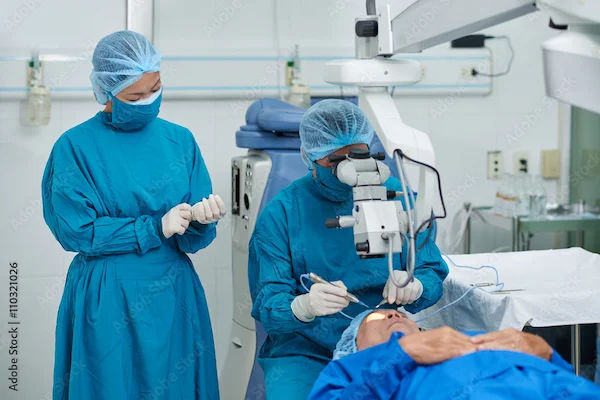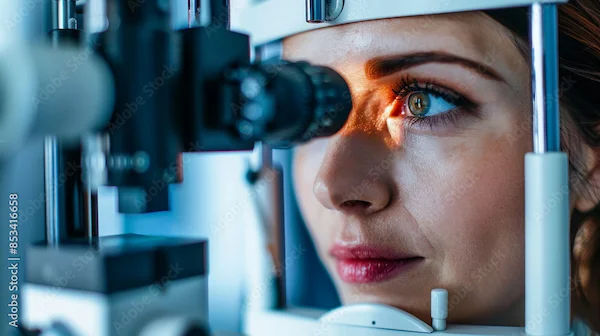What Kind Of Sunglasses Should I Wear After Cataract Surgery?
Discover the best type of sunglasses to wear after cataract surgery for optimal protection and recovery. Learn about essential features like UV blocking, polarisation, and tint to ensure comfort and eye health.

Written by Dr.Sonia Bhatt
Last updated on 16th Jul, 2025
.webp)
Introduction
Cataract surgery is a common and safe procedure that helps restore clear vision by replacing the cloudy lens in your eye with an artificial one. After the surgery, your eyes need time to heal, and protecting them from bright light and harmful UV rays is essential. One of the best ways to do this is by wearing the right sunglasses.
In this article, we’ll guide you through the best types of sunglasses to wear after cataract surgery, why they’re important, and how to choose the right pair for your needs.
Why Are Sunglasses Important After Cataract Surgery?
After cataract surgery, your eyes become more sensitive to light. The new artificial lens (intraocular lens or IOL) lets in more light than your old cloudy lens, which can make bright sunlight uncomfortable. Additionally, UV rays can be harmful to your eyes, increasing the risk of complications like inflammation or retinal damage.
Wearing sunglasses helps:
Wearing sunglasses helps to:
Reduce glare and discomfort from bright light.
Protect your eyes from harmful UV rays, which can slow down healing.
Prevent dust and wind from irritating your eyes.
Improve comfort while your eyes adjust to the new lens.
What Features Should You Look for in PostCataract Sunglasses?
Not all sunglasses are the same. Here’s what to look for when choosing the best pair after cataract surgery:
1. 100% UV Protection
The most important feature is 100% protection against UVA and UVB rays. UV exposure can harm your eyes, especially after surgery. Look for labels that say "UV400" or "100% UV protection."
2. Polarized Lenses
Polarized lenses reduce glare from reflective surfaces like water, roads, or snow. This makes them great for driving, outdoor activities, and general comfort in bright conditions.
3. Wraparound or LargeFrame Sunglasses
Sunglasses that wrap around your face or have large lenses provide better coverage, blocking light from the sides. This helps prevent stray light from entering your eyes.
4. Dark or Tinted Lenses
Medium to dark tints (gray, brown, or green) are ideal as they reduce brightness without distorting colors. Avoid overly dark lenses if you have lowlight vision issues.
5. Comfortable Fit
Choose lightweight, wellfitting sunglasses that don’t press on your nose or temples. Adjustable nose pads and flexible frames can help with comfort.
6. Blue Light Blocking (Optional)
Some people prefer sunglasses that block blue light, especially if they spend a lot of time on digital screens. However, this is not mandatory unless recommended by your doctor.
Types of Sunglasses to Consider
The types of sunglasses that can be considered are:
1. Prescription Sunglasses
If you need vision correction, prescription sunglasses can be customized to your needs. Many IOLs reduce the need for glasses, but some people still prefer them for certain activities.
2. Clip-On Sunglasses
If you already wear glasses, clip-on sunglasses are a convenient and cost-effective option.
3. Fit-Over Sunglasses
These are designed to fit over your regular glasses, providing full coverage and UV protection.
4. Photochromic (Transition) Lenses
These lenses darken automatically in sunlight and lighten indoors. They’re a good allinone solution if you don’t want to switch between regular glasses and sunglasses.
Consult Top Ophthalmologist
When Should You Wear Sunglasses After Cataract Surgery?
When one needs to wear sunglasses are:
First Few Days: Wear sunglasses indoors and outdoors to protect your eyes from bright lights.
First Few Weeks: Wear them whenever you go outside, even on cloudy days (UV rays can penetrate clouds).
Long Term: Continue wearing UVprotective sunglasses to maintain eye health and prevent future damage.
Additional Tips for Eye Care After Cataract Surgery
Tips to keep in mind:
Avoid rubbing your eyes.
Wear protective eyewear when swimming or in dusty environments.
Follow your doctor’s instructions on eye drops and medications.
Attend all followup appointments to monitor healing.
When to Consult a Doctor?
If you experience:
Severe eye pain
Sudden vision loss
Increased redness or swelling
Flashing lights or floaters
…contact your eye specialist immediately.
Need Help Choosing the Right Sunglasses?
If you’re unsure which sunglasses are best for you, consult your eye doctor. They can recommend the right type based on your lifestyle and eye health.
For expert advice or to book a consultation, visit Apollo 24|7 or schedule an appointment with an ophthalmologist today!
Final Thoughts
Choosing the right sunglasses after cataract surgery is crucial for comfort and eye protection. Look for 100% UV protection, polarized lenses, and a comfortable fit. Wearing them consistently will help your eyes heal faster and keep them safe in the long run.
Consult Top Ophthalmologist
Consult Top Ophthalmologist
Dr. S Venkateswaran
Ophthalmologist
35 Years • MBBS, PGD (OPTHALMOLOGY)
Tiruvannamalai
Shiva Eye And General Hospital, Tiruvannamalai

Dr. Syed Saifullah Bokhari
Ophthalmologist
4 Years • MBBS, MS(Ophthalmology)
Bengaluru
Vasan Eye Care, Bengaluru

Dr. Balakrishna Balaka
Ophthalmologist
6 Years • MBBS, MS Ophthalmology
Visakhapatnam
Balakrishna eye clinic, Visakhapatnam

Dr. Sahiti Salguti
Ophthalmologist
10 Years • MBBS,MS Ophthalmology
Hyderabad
Yeshass Nethralaya eye hospital, Hyderabad
Dr. Kakarla Roopa
Ophthalmologist
3 Years • MBBS MS Ophthalmology
Tirupati
Anna Gowri Hospital, Tirupati
Consult Top Ophthalmologist
Dr. S Venkateswaran
Ophthalmologist
35 Years • MBBS, PGD (OPTHALMOLOGY)
Tiruvannamalai
Shiva Eye And General Hospital, Tiruvannamalai

Dr. Syed Saifullah Bokhari
Ophthalmologist
4 Years • MBBS, MS(Ophthalmology)
Bengaluru
Vasan Eye Care, Bengaluru

Dr. Balakrishna Balaka
Ophthalmologist
6 Years • MBBS, MS Ophthalmology
Visakhapatnam
Balakrishna eye clinic, Visakhapatnam

Dr. Sahiti Salguti
Ophthalmologist
10 Years • MBBS,MS Ophthalmology
Hyderabad
Yeshass Nethralaya eye hospital, Hyderabad
Dr. Kakarla Roopa
Ophthalmologist
3 Years • MBBS MS Ophthalmology
Tirupati
Anna Gowri Hospital, Tirupati




